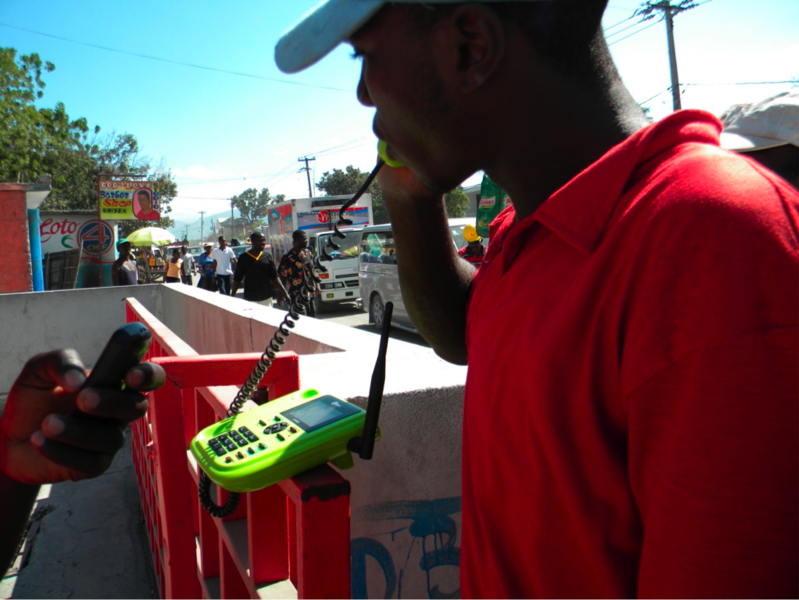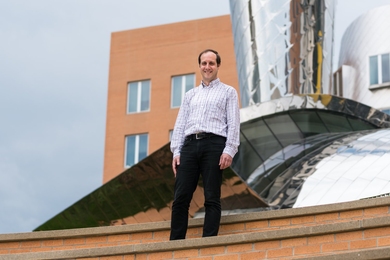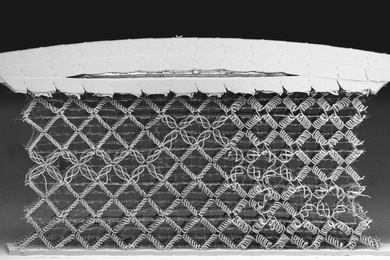One year after an earthquake killed more than 200,000 people in Haiti, two MIT Media Lab students have launched a trial for a free service meant to help Haitians find jobs as part of the country’s reconstruction.
Known as Konbit, the automated service aims to boost the Haitian economy by helping non-governmental organizations, such as Partners In Health, find local workers instead of outsourcing labor. Konbit allows unemployed Haitians to call a toll-free number to record their skills and life experiences. Creole speakers then access those messages via phone or Web, and translate and transcribe them into an online database that NGOs can search.
Last month, Konbit’s creators, graduate students Greg Elliott and Aaron Zinman, launched the first trial of the service in Port-au-Prince. Designed for 3,000 participants, the trial has received more than 1,300 phone calls to date. Once the recordings from those calls are translated and transcribed by the end of the month, Elliott and Zinman plan to approach various NGOs and encourage them to use the service.
Bringing Konbit to Haiti
As MIT News reported in March, Elliott and Zinman conceived of Konbit at a workshop during last year’s Independent Activities Period. With support from various grants, including an $8,000 IDEAS Competition Award, the students have spent the past year refining their concept and seeking feedback from NGOs, telecommunications providers and members of the Haitian community.
Last fall, they partnered with Konbit for Haiti, a community center in Miami, to beta-test the service with about 30 Haitian Americans. Most of the feedback was positive, although some participants suggested that Haitians might provide better information about themselves if the prompts were recorded by a warm and familiar voice. With that input, Konbit for Haiti turned to Haitian radio personality Bob Lemoine to re-record the prompts.
Konbit is also trying to make it easy for callers to use the service while also offering an incentive to participate. Konbit has partnered telecommunications provider Digicel to allow for free calls and texts to the service. Additionally, Digicel is offering the first 3,000 callers airtime credits to their accounts.
According to David Sharpe, head of product development at Digicel, Konbit is unique from dozens of other ideas and proposals his company has seen over the past year because it offers an easy way to connect with people who don’t own smart phones. The provider was also impressed with Elliott and Zinman’s plans to cover expenses for translation — performed by people both in Haiti and abroad — shipping and equipment. “We only had a finite number of resources,” Sharpe says. “Aaron and Greg discussed how they were going to take on all costs and deliver a solution that we recognized was not immediately needed [right] after the earthquake, but was going to be needed in the reconstruction phase.”
A call to action
One of Elliott and Zinman’s long-term goals is to make it easier for other public-service groups to get up and running after emergency situations in developing-world countries. “There’s a trend of engineers coming together for crisis response, and we’d like to help future do-gooders get past the roadblocks we faced much more quickly,” Zinman says.
One of those roadblocks was getting hardware to the country; the server that is responsible for answering Konbit’s phone calls took three months to ship, configure and test in Haiti — a process that Zinman says would have happened very quickly in the U.S. using cloud computing, which is the outsourcing of computational tasks to networked servers maintained by companies like Google.
He and Elliott plan to work with Digicel to make it easier for other organizations to run projects on the Digicel Haiti network simply by using Konbit’s server. They hope that eliminating these kinds of hurdles will encourage others to participate in Haiti’s reconstruction.
Known as Konbit, the automated service aims to boost the Haitian economy by helping non-governmental organizations, such as Partners In Health, find local workers instead of outsourcing labor. Konbit allows unemployed Haitians to call a toll-free number to record their skills and life experiences. Creole speakers then access those messages via phone or Web, and translate and transcribe them into an online database that NGOs can search.
Last month, Konbit’s creators, graduate students Greg Elliott and Aaron Zinman, launched the first trial of the service in Port-au-Prince. Designed for 3,000 participants, the trial has received more than 1,300 phone calls to date. Once the recordings from those calls are translated and transcribed by the end of the month, Elliott and Zinman plan to approach various NGOs and encourage them to use the service.
Bringing Konbit to Haiti
As MIT News reported in March, Elliott and Zinman conceived of Konbit at a workshop during last year’s Independent Activities Period. With support from various grants, including an $8,000 IDEAS Competition Award, the students have spent the past year refining their concept and seeking feedback from NGOs, telecommunications providers and members of the Haitian community.
Last fall, they partnered with Konbit for Haiti, a community center in Miami, to beta-test the service with about 30 Haitian Americans. Most of the feedback was positive, although some participants suggested that Haitians might provide better information about themselves if the prompts were recorded by a warm and familiar voice. With that input, Konbit for Haiti turned to Haitian radio personality Bob Lemoine to re-record the prompts.
Konbit is also trying to make it easy for callers to use the service while also offering an incentive to participate. Konbit has partnered telecommunications provider Digicel to allow for free calls and texts to the service. Additionally, Digicel is offering the first 3,000 callers airtime credits to their accounts.
According to David Sharpe, head of product development at Digicel, Konbit is unique from dozens of other ideas and proposals his company has seen over the past year because it offers an easy way to connect with people who don’t own smart phones. The provider was also impressed with Elliott and Zinman’s plans to cover expenses for translation — performed by people both in Haiti and abroad — shipping and equipment. “We only had a finite number of resources,” Sharpe says. “Aaron and Greg discussed how they were going to take on all costs and deliver a solution that we recognized was not immediately needed [right] after the earthquake, but was going to be needed in the reconstruction phase.”
A call to action
One of Elliott and Zinman’s long-term goals is to make it easier for other public-service groups to get up and running after emergency situations in developing-world countries. “There’s a trend of engineers coming together for crisis response, and we’d like to help future do-gooders get past the roadblocks we faced much more quickly,” Zinman says.
One of those roadblocks was getting hardware to the country; the server that is responsible for answering Konbit’s phone calls took three months to ship, configure and test in Haiti — a process that Zinman says would have happened very quickly in the U.S. using cloud computing, which is the outsourcing of computational tasks to networked servers maintained by companies like Google.
He and Elliott plan to work with Digicel to make it easier for other organizations to run projects on the Digicel Haiti network simply by using Konbit’s server. They hope that eliminating these kinds of hurdles will encourage others to participate in Haiti’s reconstruction.






